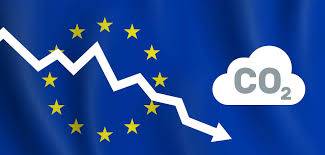
We all keep in mind the very last report of the IPCC which was, to say the least, quite frightening; emphasizing that human-induced climate change is already generating many extreme weather and climate events in all regions of the world and predicting a bleak future for us in the absence of appropriate action. Today, we have all more or less integrated the fact that "limiting human-induced global warming to a specific level requires limiting the cumulative CO2 to reach the ultimate stage in which there will be no more 'CO2 emissions and where other greenhouse gases have been largely contained. "
In this context, the European Union (EU) has set itself the ambitious objective of becoming climate neutral by 2050, that is to say of becoming a continent with zero net greenhouse gas emissions. Understand that "net" means that greenhouse gas emissions emitted in the EU in 2050 do not exceed the capacity of sinks, such as forests, to absorb carbon dioxide from the atmosphere. So far, the European Environment Agency suggests that the EU is not really on track to meet its own goals.
Since all areas of modern human life, including our mobility (cars, trucks, trains), energy (power plants) and buildings (heating, electricity) still depend, to a large extent, on fossil fuels such as oil and gas, the net zero goal involves profound changes within a generation. Changes of this magnitude and speed have so far hardly been observed in human history.
To achieve this change, the EU intends to ensure that public policies, i.e. actions taken by public actors, including governments and international organizations, encourage actors in our societies, as well. private than public, to reduce their greenhouse gas emissions. The origins of policies to combat climate change date back, at least, to 1992, following the international environmental summit in Rio de Janeiro which led to the United Nations Framework Convention on Climate Change.
We can now look back at a nearly 30-year history of EU policymaking, which is roughly how long we have until 2050. In an article recently published in the International Spectator , it was set out to understand what policy changes in the past can tell us about the future. In particular, it is necessary to draw on a public database that the EU uses to monitor its greenhouse gas emissions and, since the 2000s, also on the development of its policies, including information on climate policies and specific measures of all EU Member States.
At first glance, there are a lot of reasons to celebrate. The number of policies and measures in all EU Member States had grown to around 2,000 in 2019. Looking at ten years of data on climate policy, we seek to identify patterns of climate policy making, such as 'i.e. in which policy sectors (such as energy, health or agriculture) EU Member States introduce their policies, and what types of policies are involved (for example, whether these are economic instruments such as taxes or information instruments that seek to inform citizens about climate change and what can be done).
The results reveal that, although the number of instruments has increased, substantial policy changes have been rather slow and gradual just as political experts predict. It can be seen that the expected greenhouse gas emissions have in fact decreased and that the relative proportion of policies in each sector remains more or less unchanged. A stable distribution of sectoral policies is surprising, given the known imbalances and sectors such as mobility, which have been notoriously difficult to decarbonise. A relatively small decrease in policy diversity (by type of instrument) can, however, be a useful indication of policy maturation and therefore a sorting between more effective and less effective instruments. On the whole, this relatively slow evolution does not correspond to the need for rapid decarbonization by 2050. The analysis highlights the need to design increasingly effective policies in order to have a chance of achieving carbon neutrality.
It is essential that the EU and its Member States are able to monitor not only global greenhouse gas emissions, but also more systematically assess the performance of the thousands of climate policies and measures they are taking. have set up. The results give researchers and evaluators a basis to explore the merits of different policies or sets of policies to guide societies towards climate neutrality.
Greater attention to the changing climate policy mix in the EU, as well as to sectoral axes, can be a way of contributing to a dramatic reduction in greenhouse gases.
Posted on 2021-10-05 17:38








Comments